Balance of Power
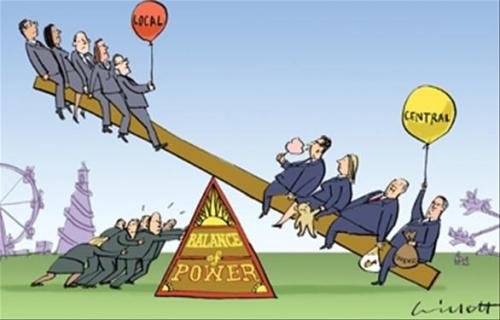
No concept in the study of international relations has been discussed
more often than this one. It has been defined in so many ways, however,
that it has become an ambiguous idea. Used objectively or
descriptively, the term indicates the relative distribution of power
among states into equal or unequal shares.
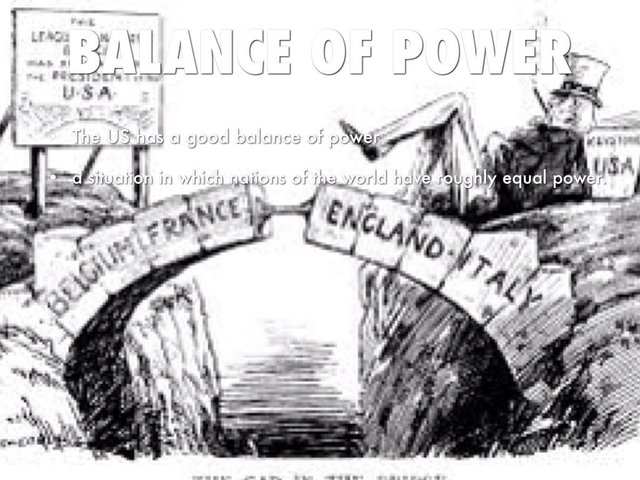
Traditionally, it refers to a state of affairs in which no one state predominates over others. Prescriptively,
it refers to a policy of promoting a power equilibrium on
the assumption that unbalanced power is dangerous. Prudent states that
are at a disadvantage in the balance of power will (or at least should)
form an alliance against a potentially hegemonic state or take other
measures to enhance their ability to restrain a possible aggressor. Also,
one state may opt for a self-conscious balancing role, changing sides as
necessary to preserve the equilibrium. A balance of power policy
requires that a state moderate its independent quest for power, since
too much power for one state may bring about self-defeating reactions
of fear and hostility from other states.
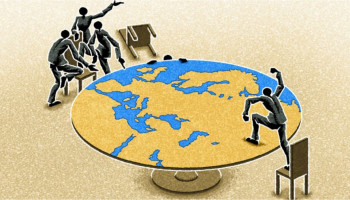
All balance of power systems have certain conditions in common:
1 a multiplicity of sovereign states unconstrained by any legitimate
central authority;
2 continuous but controlled competition over scarce resources or
conflicting values;
3 an unequal distribution of status, wealth, and power potential
among the political actors that make up the system.

Inequality and the ever-present threat of violence combine to give
the dominant and the subordinate states a shared but unequal interest
in preserving the order of the system, whose equilibrium protects
their sovereignty. The balance of power is a kind of compromise
among states that find its order preferable to absolute chaos, even
though it is a system that favours the stronger and more prosperous
states at the expense of sovereign equality for all of them.

Great powers play the leading roles in balance of power systems
because of their preponderant military force and their control of key
technologies. A dominant or hegemonic state will often try to justify
its position either by providing certain public goods for other states
(such as a beneficial economic order or international security), or
because it embraces values that are common to a set of states. Great
powers reap a disproportionate share of the benefits of the system, but
they also bear a greater responsibility as its regulators.
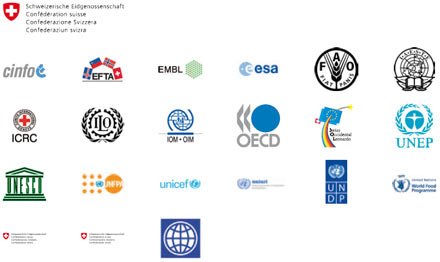
It is common to make some key distinctions about the balance of
power. First is the distinction between unipolarity, bipolarity, and
multipolarity.
• Unipolarity is a situation in which one state or superpower dominates
the international system. Many would argue that the United
States is in this position today.
• Bipolarity exists when two states or blocs of states are roughly equal
in power. The term is often applied to the period of the cold war
between the United States and the Soviet Union, although it is
misleading. Simply because the two superpowers were both more
powerful than all other states, they were not equally as powerful as
each other. The Soviet pole was far weaker than its rival in economic
terms, although its ability to engage in a sustained nuclear
arms race with its rival and project its conventional military power
abroad concealed its underlying weakness.
• Multipolarity refers to a situation in which there are at least three
great powers. The classic example is nineteenth-century Europe. In this case, one state’s greater military and economic strength does
not necessarily give it preponderance because weaker states can
combine against it.

A second important distinction is between regional or local balances
and the balance of power in the international system as a whole.
Although historians have often spoken of the European balance of
power in the eighteenth and nineteenth centuries as if it were the
whole of international relations, this was effectively true only for the
brief period when European states dominated the rest of the world.
Today, we have a number of regional balances overlaid by a unipolar
pattern.
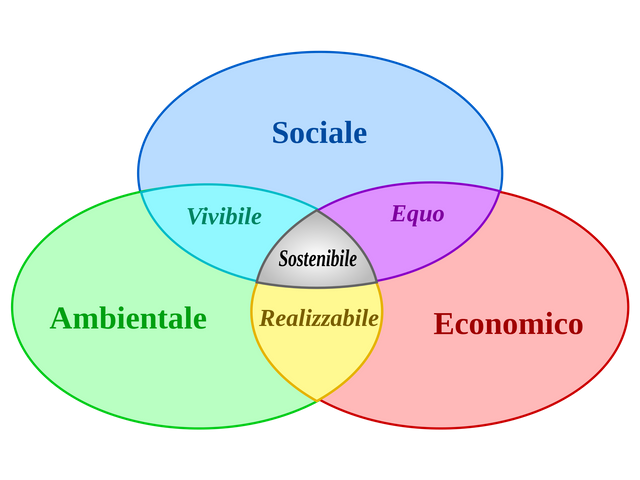
A third distinction is between a subjective and an objective balance of
power. One of the great difficulties of evaluating the balance of power
in the twenty-first century is that power resources are unevenly
distributed among the great powers and there is no simple correspondence
between possession of a resource and the ability to control
outcomes as a consequence. For example, whilst the United States
is overwhelmingly dominant in terms of military power, economic
power is much more evenly distributed between the United States,
Western Europe, and Japan.
One of the most contested issues in the study of international relations
is the relationship between the balance of power and the stability
of the international system. One should note that the term ‘stability’ is
itself contested! For example, it can mean peace but it can also refer to
the endurance of a particular distribution of power regardless of how
peaceful it is. Some scholars argue that multipolarity is less stable than
unipolarity or bipolarity. Under multipolarity, threats are allegedly
more difficult to evaluate, and there is a tendency for states to ‘pass the
buck’ and rely on others to balance against an emerging state. On the
other hand, when power is concentrated among one or two superpowers
that compete at a global level, they are likely to export their
rivalry abroad.
For example, although the United States and the former
Soviet Union never fought a war directly with each other, over 20
million people died in the Third World as the superpowers intervened
in a series of so-called ‘proxy wars’ in the second half of the twentieth
century.
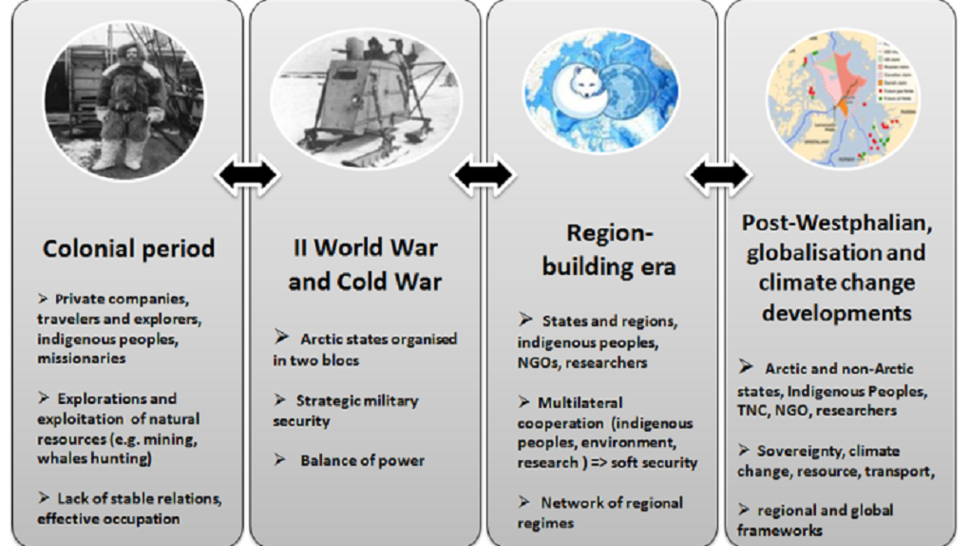
The debate between supporters and opponents of particular balance
of power systems is inconclusive for two main reasons. First, the distribution
of power among states is a variable located at a structural level
of analysis. Its relationship to outcomes at the level of relations among
states has to be determined in light of the character of the great powers and their particular relationships. Second, since the origins of the modern
state system in the seventeenth century, there are too few cases of
different systems across which one can make meaningful comparisons.
The balance of power is a dynamic concept which, in practice, has to
be understood in context. For example, it is difficult to draw conclusions
about the allegedly bipolar balance of the cold war when so
much of the competition between the United States and the former
Soviet Union revolved around the novel challenges of the nuclear era.
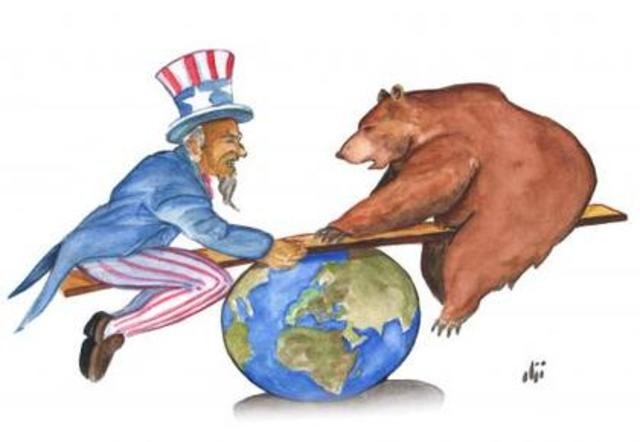
See also: alliance; anarchy; clash of civilisations; cold war; concert of
powers; geopolitics; great power; hegemonic stability theory; levels of
analysis; mutually assured destruction; power; realism; superpower
Further reading: Haas, 1953; Kegley and Raymond, 1992; Layne, 1993;
Mearsheimer, 1990; Wagner, 1993; Waltz, 1979; Wilkinson, 1999
very educational post.
You got a 31.91% upvote from @votepower courtesy of @a24houreschool!
Earn 85% earning payout by delegating SP to @votepower
If you are looking to earn a passive no hassle return on your Steem Power, delegate your SP to @votepower by clicking here.
You will earn 85% of the voting bot's earnings based on your delegated SP's prorated share of the bot's SP each day! You can also undelegate at anytime.
Our Discord Channel: https://discord.gg/C35FVaR
Great post!
Thanks for tasting the eden!
@a24houreschool you were flagged by a worthless gang of trolls, so, I gave you an upvote to counteract it! Enjoy!!
Congratulations @a24houreschool! You have received a personal award!
Click on the badge to view your Board of Honor.
Do not miss the last post from @steemitboard:
Congratulations @a24houreschool! You received a personal award!
You can view your badges on your Steem Board and compare to others on the Steem Ranking
Vote for @Steemitboard as a witness to get one more award and increased upvotes!
Congratulations @a24houreschool! You received a personal award!
You can view your badges on your Steem Board and compare to others on the Steem Ranking
Do not miss the last post from @steemitboard:
Vote for @Steemitboard as a witness to get one more award and increased upvotes!